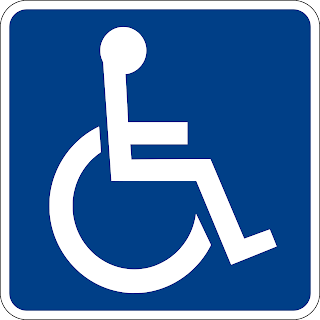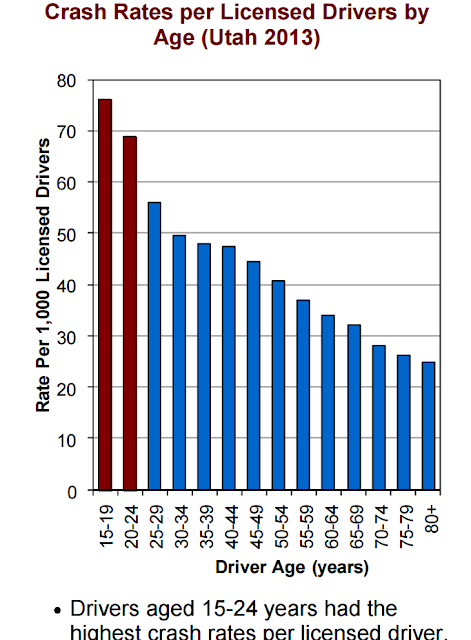Discrimination is treatment or consideration of, or making a distinction in favor of or against, a person or thing based on the group, class, or category to which that person or thing is perceived to belong to rather than on individual merit. This includes treatment of an individual or group based on their actual or perceived membership in a certain group or social category, "in a way that is worse than the way people are usually treated". It involves the group's initial reaction or interaction going on to influence the individual's actual behavior towards the group leader or the group, restricting members of one group from opportunities or privileges that are available to another group, leading to the exclusion of the individual or entities based on logical or irrational decision making.
The
State of Utah routinely discriminates against drivers with
disabilities by subjecting them to unnecessary road tests and medical
exams, and imposing arbitrary restrictions on their driving.
The
Utah Drivers License Division applies its Medical Evaluation Program
– meant to identify drivers with medical problems that might cause
them to crash – to punish drivers who are capable and safe, but
have a physical disability. The practice is based on stereotypes
about people with disabilities, and it serves as a punitive
imposition on those drivers, who must spend extra time and money
proving they don’t pose a risk.
Presumed
guilt unless and until they can prove innocence to the satisfaction
of the State of Utah.
The
State of Utah Drivers License Division presumes to interpret every
possible evidence by their own privately held and arbitrary set of
special rules. The propriety of their management of such concerns is
not in question. The problem is a presumptive overreach that extends
far beyond any reasonable measures. Such abusive bullying is clearly
a violation of the federal Americans with Disabilities Act and the
Rehabilitation Act.
Obviously,
disabled people over the years have
endured being subjected to this institutional prejudicial
discriminatory attitude. Though the State treats them
capriciously, and
bullies them into fearful submission, almost all fear
to complain, as
the State routinely threatens to restrict
or revoke their licenses in
reprisal.
The
State
commonly
cites medical conditions affecting a person’s ability to drive as
the cause of automobile
accidents.
But there is no evidence to
substantiate the claim that
drivers with orthopedic impairments, or who use adaptive
hand
controls, present any
increased accident risk.
The
State of Utah mandates that health care providers report when
patients in their care are treated for any of the health conditions
iterated on their list of politically-incorrect conditions. Once a
driver is forced into the Drivers License “medical review”
program, he or she remains there forever, without hope of reprieve.
While in the program, drivers are routinely required to undergo
special medical testing, and forced to provide documentation from
doctors and therapists disclosing personal medical information that
is otherwise supposed to be protected from such government prying.
Handicapped people are routinely subject to a set of totally
arbitrary special restrictions placed on their licenses. The State
is not required to justify or substantiate, and generally gives the
impression that there is no possible appeal from their permanent
punitive measures.
Among
the unjustified restrictions imposed against me personally by the
State:
- Limit maximum operating speed to roads with speed limit of 40 mph or less
- Distance from home I am permitted to travel must be within a radius of 15 miles
- Restricted to daytime driving
- Prohibited from travel on freeways and interstates
- Prohibited from travel in areas with higher speed limits
- Restricted to operation of my own vehicles only when accompanied by a fully licensed “normal” driver
The
State of Utah has already revoked my driving license, so there is
really
nothing they can do to impose further
additional
punitive
measures or implement additional arbitrary restrictions. They
have to be satisfied with fabricating results from the “driving
test” that fail to qualify for their
standard of drivers
license renewal. I suspect they enjoy the feeling of smug moral
superiority that derives from such abuse of
the public trust.
A
good place to address this problem would be to put
a stop
to
the
routine
discrimination
against drivers with disabilities based wholly
on
speculation, stereotypes and generalizations. The
State of Utah is not entitled to act based on their suspicion that a
particular driver MIGHT be dangerous. Either
I am, or I am not. Prove it.
Since
the State of Utah Drivers License Division has demonstrated an
ingrained, institutional predisposition to such behavior, it would be
fair and appropriate for their
records to be regularly
subjected to routine audit
by an outside independent and objective auditing agent. This
auditing must needs be conducted at random intervals selected by the
auditor and
unannounced to the management,
so that the Drivers License Division is unable to easily falsify or
sequester appropriate documentation.
It
might also be effective for the State to intervene with at least
temporary qualified independent
management
oversight, since
the abuse of public trust is apparently found through all levels of
this
bureaucratic institution.
These discriminatory practices are obviously not the fault of any
one particular individual, although
I have met certain people who exhibit the greatest enthusiasm for
pursuing
the
job of punishing handicapped people. Perhaps some of them fully
believe that they are just doing their duty. And that is probably
the most unfortunate aspect
of all these problems.
The State of Utah publishes an elaborate and comprehensive summary showing numerous charts and statistics regarding all motor vehicle accidents. There are no graphics or statistics to substantiate the prejudice against handicapped drivers, though there are other circumstances which are clearly related to the incidence of traffic accidents.Apparently they don't really bother to read their own reports.
Overall, a general attitude seems to prevail in the State of Utah Drivers License Division that is so aptly and succinctly characterized by one of their recent public service ad campaigns.
In my case there is an implied comma after the injunction.
They seem to be saying, we automatically assume a priori that the people we work for are stupid, and treat them accordingly. And of course, that prejudice goes double for handicapped individuals. The contemptuous and parochial posturing apparently informs this attitude and the institutional policy that formalizes it
More about the driving test results...





2 comments:
I am the new guy
Merry Christmas!
Post a Comment